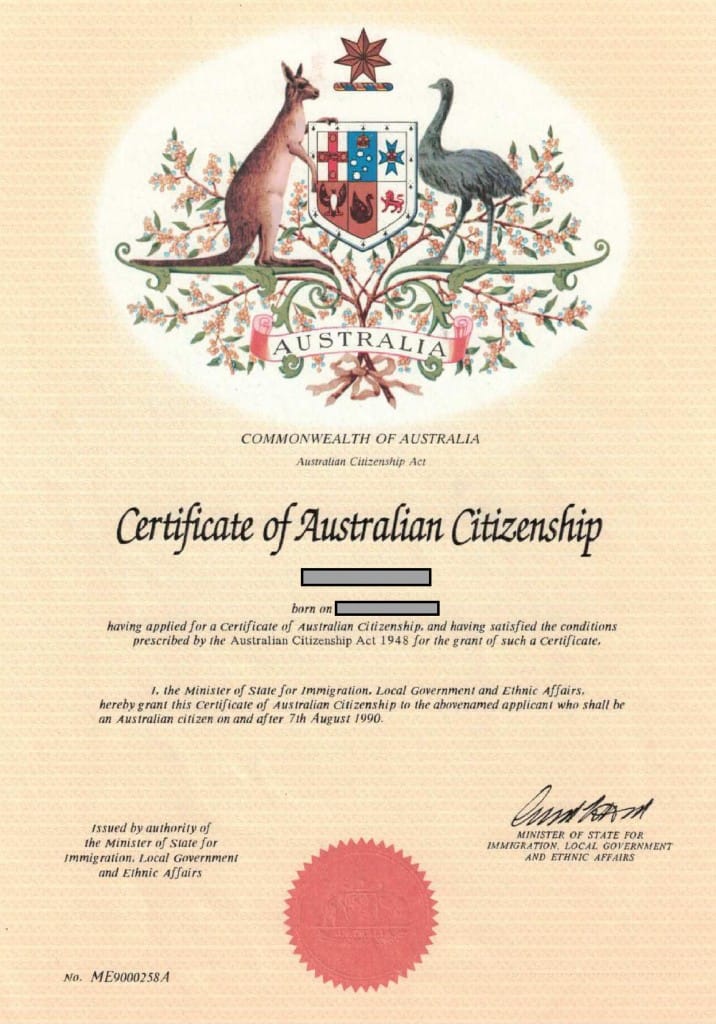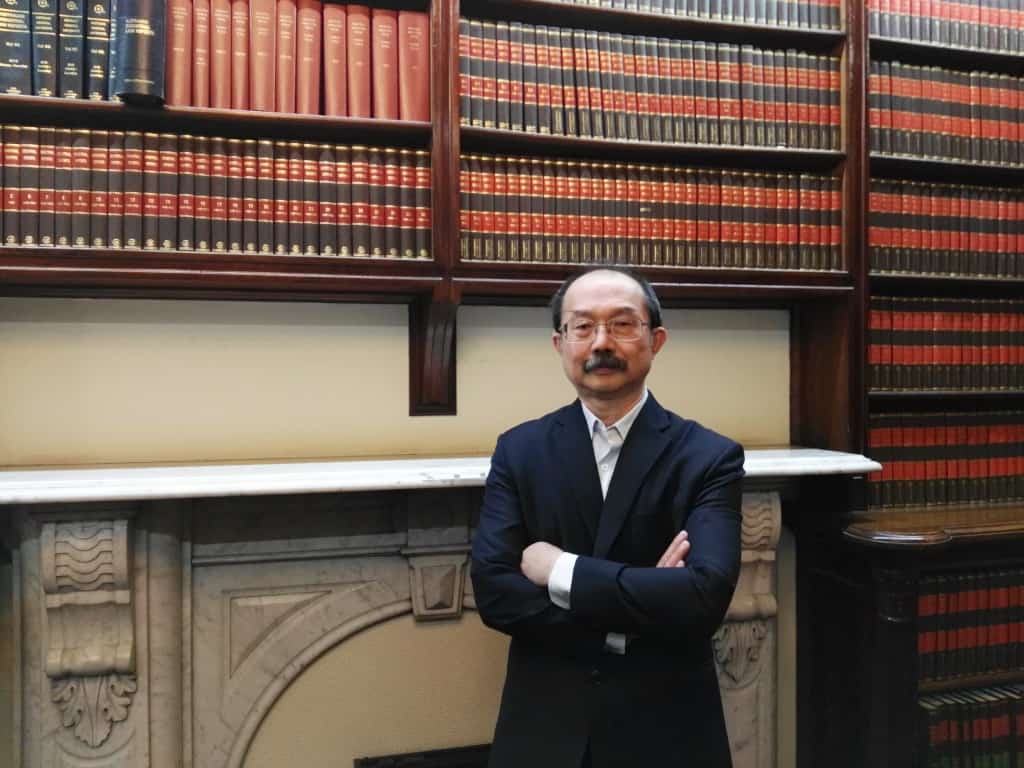
Become an Australian citizen by conferral or applying to become an Australian citizen under s. 21 of Australian Citizenship ACT 2007 – you must be an Australian permanent resident and satisfy a number of criteria, including general residence requirement (click here to learn if you need this requirement), must be of good character (click here to learn more) and the Department must be satisfied with your identity (click here to learn more).
When you apply to become an Australian citizen by conferral, you are required to complete an online application and provide a number of documents to support your application. It is very important that you must take care when completing or when answering the questions in the application form as your application may be refused under s. 24(1) of the Act.
Section 24(1) of the Act states if “a person makes an application under section 21, the Minister must, by writing, approve or refuse to approve the become becoming an Australian citizen”.
When applying to become an Australian citizen by conferral, you must not provide incorrect answer(s) or fake document because “the grant of Australian citizenship is a privilege not bestowed lightly. It is given to those who uphold the values of the Australian community and who are willing to make a positive contribution to the country they want to call home” (Fenn v MIMA [2000] AATA 931 at [8]).
In the case of Bongely and Minister for Immigration, Citizenship, Migrant Services and Multicultural Affairs (Citizenship) [2021] AATA 2360 (15 July 2021), Bongely was born in Congo (DRC) first arrived in Australia as child on his father’s Partner subclass 309 visa (click here to learn more about subclass 309). In March 2017 (aged 21 and having lived in Australia for over years), he lodged an application to become an Australian citizen by conferral. In his application he gave date of birth as 20 September 1995. He provided his Document of Travel showing his date of birth as 20 September 1995, a DRC birth certificate showing his date of birth as 20 September 1995 and a WA driver’s license showing his date of birth as 20 September 1995.
Bongely produced his DRC school records (to support his identity pursuant to s 24(3) of the Act) which he paid a family friend to obtain, the records turned out not to be genuine. He then advised the Department that he did not pay close attention to the records and if he did he would have known that they were fraudulent documents and would not have submitted them to the Department. It was on this that cause the Tribunal to consider whether he is of good character pursuant to s. 21(2)(h).
Identity
There is no discretion in s. 24(3) available to the Department to grant Australian citizenship unless they are satisfied of the identity of the applicant. “Identity” is not defined in the Act but is covered in chapter 13 of the Australian Citizenship Policy (CPI). CPI 16 states that (at [4.12]):
“It is not sufficient to be satisfied of a person’s identity at one point in time, as a person’s identity is not a point in time concept; it must be verified incrementally throughout a person’s life and considered historically”.
CPI 16 provides 3 pillars of identity to be used when assessing identity and they are:
- Biometrics – personal identifiers such as fingerprints, facial images or signature.
- Documents – genuine documents that are issued with robust identity proofing processes with issuance protocols and security features. For e.g., documents contain biodata, or personal information, such as name, date of birth, nationality, and containing biometric information.
- Life story – a narrative of the events that happened to them from birth to present. It should include descriptions of family composition, education, employment countries of residence, countries visited, social footprint, and online presence
Applying to become an Australian citizen by conferral, you must satisfy the Department as to your identity, the Department will rely on each of the above 3 pillars of identity. The Department must reach an affirmative belief as to your identity (Rezai and Minister for Immigration, Citizenship, Migrant Services and Multicultural Affairs [2021] AATA 145).
Good character
Section 21(2)(h) of the Act states that a person is eligible to become an Australian citizen if the Minister is satisfied that the person is of good character at the time of the Minister’s decision on the application.
“Good character” is not defined in the Act. In Irving v MILGEA (1996) 68 FCR 422, Lee J said at 431-432 “the words ‘good character’ should be taken to be used in their ordinary sense, a reference to the enduring moral qualities of a person, and not to the good standing, fame or repute of that person in the community. . . . . A person who has been convicted of a serious crime and thereafter held in contempt in the community, nonetheless, may show that he or she has reformed and is of good character …. Conversely, a person of good repute may be shown by objective assessment to be a person of bad character.”
In short, when applying to become an Australian citizen by conferral you must be of good character, good character is not a reputational test, but an objective assessment. It requires ‘consideration of an aggregate of qualities” and a single adverse incident of ‘sufficient weight and seriousness’ can outweigh many good qualities (Prasad and MIEA [1994] AATA 326 at [7]).
CPI 15 (Assessing character under the Citizenship Act) states “An applicant who is a person of good character would generally be expected to exhibit the following characteristics:
- not practise deception or fraud in dealings with the Australian Government, or other organisations. For e.g., intentionally providing false personal information (such as fraudulent work experience or qualification) or other material deception during visa and citizenship applications.
CPI 15 also provides “it also necessary to consider other information that is relevant to a person’s character such as family life, for e.g., raising children, in a stable home environment, employed, paying taxes, and doing community work. In addition, expressing genuine remorse for past wrong-doing and the time that has elapsed since the wrong-doing.
In Taradel and MILEA [2005] AATA 1255, the Tribunal observed at [23] that “dishonesty in dealings with the department is a very serious matter …. [because] the integrity of the immigration system depends on individuals telling the truth about their personal circumstances and history …. When dishonesty comes to light, it must be dealt with firmly to deter others who might intend acting dishonestly.”
Dishonesty includes providing documentation that you knew or ought to have known is unlikely to be of any probative value, without providing the necessary explanation and qualification that would enable the Department to appreciate the value of the evidence: Sakhi Zada and Minister for Immigration, Citizenship, Migrant Services and Multicultural Affairs (Citizenship) [2020] AATA 1729 at [73].
When Bongely’s father apply for Partner subclass 309 visa listing him as being born on 20 September 1995 in Q 38 of form 47SP and on Q 64 of the same form, his date of birth was listed as 21 October 1995. On form 40SP, his mother listed his date of birth as 21 October 1995. He provided his birth certificate showing his date of birth to be 21 October 1995. However, his mother provided a statutory declaration declaring that he was born on 21 October 1995. He further provided a pathology report listing his date of birth as 21 October 1995. When he was applying for the subclass 309 visa, his migration health check-up recorded his date of birth as 26 October 1995. He later provided a replacement birth certificate which listed his date of birth as 20 September 1995. Sometime in November 2019 his mother told him that he was born on 21 October 1995.
When his application to become an Australian citizen by conferral was refused by the Department he applied to the AAT and gave his date of birth as 20 September 1995. When asked by the Tribunal why he put 20 September 1995 as his date of birth when applying to the AAT, he could not explain why even though he already knew from his mother that he was born on 21 October 1995.
The Tribunal finds that Bongely’s date of birth is 21 October 1995. And on his school records the Tribunal could not be certain if they were fraudulent documents. The Tribunal concluded that Bongely was careless in providing evidence because he admitted that he did not pay due care and attention to, and which he says he would likely have considered to be fraudulent if he had paid sufficient attention.
Furthermore, Bongely made a number of errors in his application to become an Australian citizen by conferral even though he has a good command of English and the questions were plain and simple. Here the Tribunal finds that he has at best been flippant in completing his application to become an Australian citizen by conferral. On balance, the Tribunal finds it more likely that he has been careless in completing the application form, rather than intentionally dishonest.
The Tribunal was satisfied with Bongely’s identity prior to coming to Australia and after coming to Australia on the basis of his biometric evidence.
However, the Tribunal is concerned with his incorrect answer given on his application to become an Australian citizen by conferral. The Tribunal concluded that the failure to answer simple questions in a forthright manner raises questions concerning his honesty. The Tribunal do not know why Bongely had lied in his application, finds that he simply did not give sufficient weight to the need to ensure that the information he provided was complete, truthful and correct in every detail. On this basis, the Tribunal is not satisfied that Bongely is of good character.
With regard to his school records, the Tribunal said that Bongely should have included information about how he went about obtaining it and the fee he paid. The Tribunal said that this is further evidence that he lack appreciation for the level of detail and diligence required when making an application to become an Australian citizen by conferral.
The Tribunal said that it does not make a finding that Bongely is not of good character, it simply unable to be satisfied, on evidence before it, that he was of good character at the time of its decision, in the context of his lack of demonstrated appreciation for the need to be both honest and forthcoming in his dealing with the Department, irrespective of any personal cost.
Australian migration law and Citizen law are complex and difficult to understand, contact our immigration lawyer for consultation (fee applies) to assist you on becoming an Australian citizen by conferral.

 041 222 4020 or WeChat: AUDvisa
041 222 4020 or WeChat: AUDvisa
This article is not intended to be or taken as migration or citizenship legal advice. The author of this article disclaims any liability for any action or omission on the information provided or not provided in this article. You should always consult an immigration lawyer or a registered migration agent to form an informed opinion on your immigration matter.



